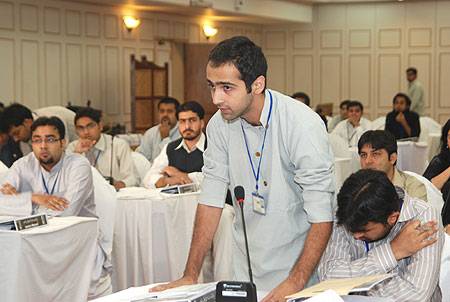On the eve of 70th independence celebration of Pakistan, the Parliament – both National Assembly and the Senate – unanimously recommended the revival of student unions in educational institutions and passed a resolution in this regard. The revival of student unions in educational institutions came under discussion on the floor of Senate of Pakistan through a motion moved by Senator Rubina Khalid. Accordingly, on 12th January 2016, the Senate constituted a Committee of Whole to deliberate on this important issue and present recommendations. The Senate Committee, after extensive deliberations and consultations with concerned stakeholders, presented its complete recommendations on 22nd August, 2017.
Student unions were banned during Gen. Ziaul Haq’s regime. The order was rescinded by the late Benazir Bhutto in 1988, however, in 1993; the Supreme Court imposed a ban on the unions on the grounds that they contributed to violence on campuses.
The ban on student unions in 1984 put society in a prolonged suffering for more than three decades; slowly allowing fundamentalism, extremism, linguistic hatred, sectarianism and other reactionary negative tendencies at education institutions of Pakistan, which are considered a hub of ideas, innovation and knowledge creation. This step also eliminated the representation of elected student representatives at university senates/syndicates, governing and decision making statutory bodies. The absence of student unions has also severely affected the culture of dialogue, democratic values and engagement of students in positive extra-curricular activities at university campuses. During more than one and half years of deliberations, it was noticed by the committee that the ban on student unions had affected campus development and welfare, damaged the personal growth of students and healthy debates, caused damage in form of lack of student elections. And by extension, it leads to the death of the concept of representative governance in the minds of our youth. The committee acknowledged the vital role of youth in the progress of the country and society around the globe.
Reacting over the findings of the committee, Chairman Senate of Pakistan Mian Raza Rabbani said that Mashal Khan’s murder would not have taken place if student unions were allowed on the campus. Through the resolution, the Senators stressed that the federal and provincial governments must ensure strict observance of no-weapons policy on campuses and that administrations should maintain peace in educational institutions by making unions follow a set code of conduct. In addition, no student should be granted membership of a union without clearing all exams. Referring to the Supreme Court’s 1993 ban on student unions, the resolution said that restoring student unions would not be a violation of court orders because the Constitution of Pakistan vide Article 17, gives everyone the right to form associations. The recommendations and resolution stressed on the federal and provincial governments to take appropriate measures accordingly.
Now, it is the responsibility of the federal and provincial governments to develop code of conduct for revival of students unions in educational institutions of Pakistan. This code of conduct needs to be developed in consultation with vice chancellors, college principals, federation of all Pakistan universities academic staff associations and students as well. Recourse to the best international practices could be greatly helpful in this regard. At the same time the representation of students, major stakeholder and population of any educational institution, should also be restored in governing bodies of universities and other academic institutions across the country. In the light of this unanimous resolution, strict measures should be undertaken against use of weapons on university campuses which has taken away lives of many young and educated people. The code of conduct should also aim at inculcating the values of responsible & active citizenship, tolerance, peace, harmony, co-existence and respect for other ideas/ideologies through promoting culture of dialogues, discussions, seminars, debates, literary sessions, workshops and peace actions.
According to a countrywide survey titled “Civic Health of Pakistani Youth” conducted by Centre for Civic Education Pakistan, a reputed think tank, a vast majority of Pakistani youth (69.6%) believes that extremism is on the rise among the youth. An overwhelming majority of 85.4% believe that Pakistani youth can play a constructive role in combating growing violence and extremism in the society. During a recent exchange of views between members of law enforcement who are familiar with the intricacies of extremism in the country and educationists from 40 universities at Karachi, there was consensus among all stakeholders that there are numerous indications of a radical mind-set taking root in Pakistan’s higher institutes of learning. The internet has made it even easier for extremist elements to ensnare naïve, impressionable young people, including women. A case in point is Noreen Leghari, an MBBS student from Hyderabad, who was arrested in April on suspicion of being involved in terrorism; she later confessed she was to be used as a suicide bomber.
The revival of student unions can be greatly helpful in addressing this important problem in an effective way as meaningful engagement of youth in various extra-curricular activities could also lead towards peaceful and tolerant campuses.






